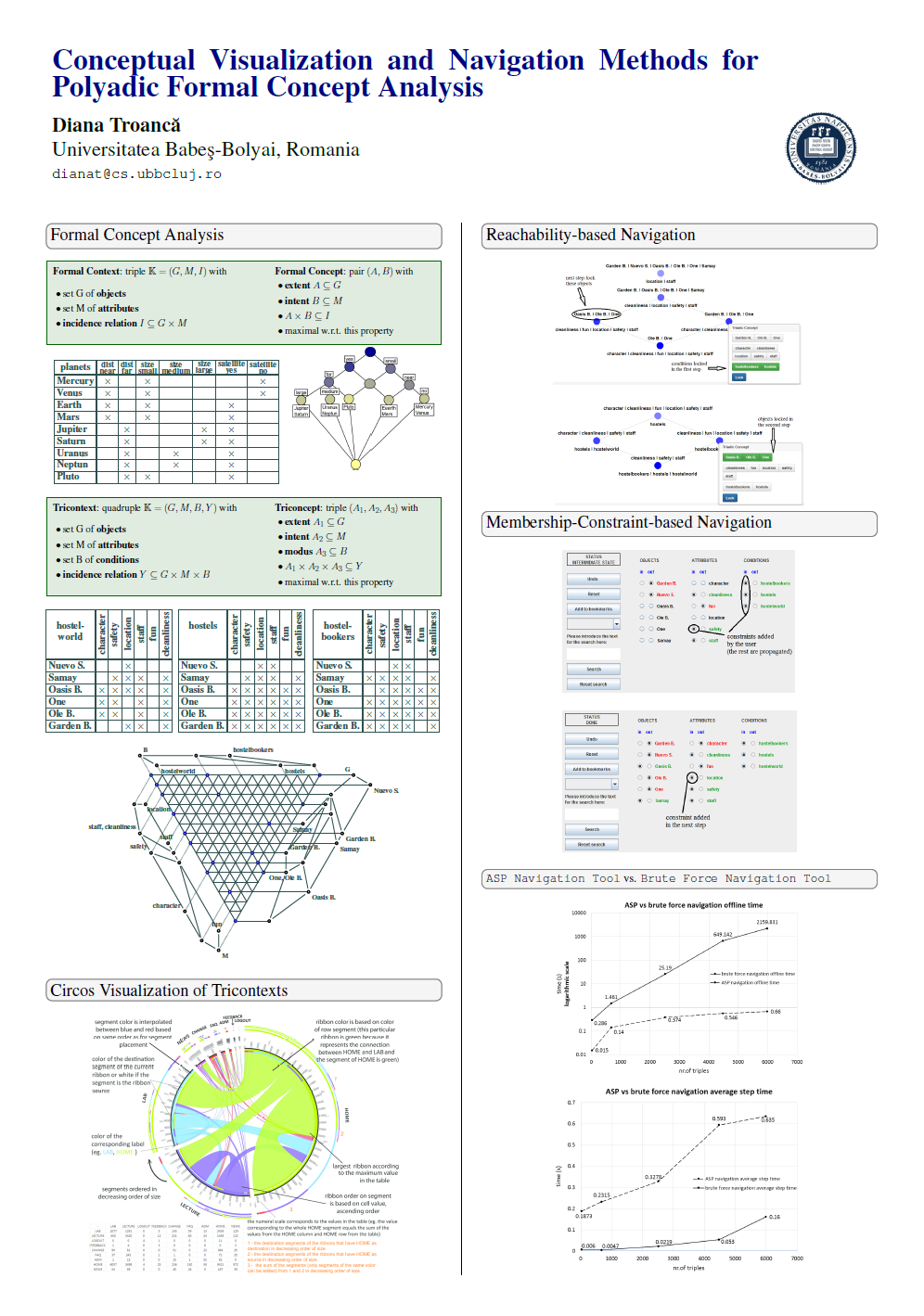Abstract:
In this paper, we focus on the problem of investigating user behavior using conceptual structures distilled from weblogs of an educational e-platform. We define a set of so-called attractors as sets of scales in conceptual time systems and compute user life tracks in order to highlight different types of behaviors. These life tracks can give valuable feedback to the instructor how his students are using the online educational resources, analyzing their behavior and extracting as much knowledge as possible from the log access files. This might also be helpful to analyze the usability of the online educational content, eventually for improving the structure of the platform and to develop new educational instruments.
About
Activities
FCA Tools Bundle
FCA Tools Bundle is a website containing a collection of tools that can be used for conceptual structure analysis.
Research Seminars - Academic year 2017-2018
Usually the meetings are held in 406 room, 58-60 Teodor Mihali street, each Monday at 14:00.
Publications
Keywords:
Life tracks, Temporal Concept Analysis, Web logs analysis, Conceptual structures, User behavior, Attractors
A FCA Strategy for Improving Web-Based Learning Sites
Abstract:
Nowadays, online educational systems show a rapid development due to the growth of the Internet, which offer unique opportunities to improve them based on users’ experiences. This paper presents advances of a Formal Concept Analysis (FCA) based strategy for improving web-based learning sites. We have used together Web Usage Mining and Formal Concept Analysis techniques in order to create a visual overview of exploring web-logs and discover knowledge in web logs. We have focused
on visualizing triadic data in order to emphasize user dynamics through the educational systems. Switching from a triadic to a polyadic perspective we have detected repetitive browsing habits. From all the revealed behaviors we distill then users life tracks by using Temporal Concept Analysis.
Keywords:
Web usage mining, Life track, Behavioral patterns, Online e-learning environment, Temporal Concept Analysis, Formal Concept Analysis, Triadic Formal
Concept Analysis.
Conceptual Visualization and Navigation Methods for Polyadic Formal Concept Analysis
Abstract:
Conceptual knowledge is closely related to a deeper understanding of existing facts and relationships, but also to the argumentation and communication of why something happens in a particular way. Formal Concept Analysis (FCA) is the core of Conceptual Knowledge Processing. It emerged from applied mathematics and quickly developed into a powerful framework for knowledge representation. It is based on a set theoretical semantics and provides a rich amount of mathematical instruments for representation, acquiring, retrieval, discovery and further processing of knowledge. FCA was introduced in the dyadic setting [Ganter and Wille, 1999] and extended to a triadic [Lehmann and Wille, 1995] and eventually n-adic setting [Voutsadakis, 2002]. Intuitively, dyadic datasets can be understood as objects related to attributes and, in addition, to conditions for the triadic case. FCA defines concepts as maximal clusters of data in which all elements are mutually interrelated. A common problem for n-adic FCA is concept visualization and navigation. The goal of my thesis is to find visualization and navigation paradigms that can be applied to higher-dimensional datasets. Therefore, we study the triadic case and propose several visualization and navigational approaches. Furthermore, we evaluate these approaches, study their generalizations and extend them, where possible, to n-ary formal contexts.
Keywords:
Conceptual Knowledge Processing, Formal Concept Analysis, visualization, navigation, higher-dimensional datasets
Activities
FCA Tools Bundle
FCA Tools Bundle is a website containing a collection of tools that can be used for conceptual structure analysis.Research Seminars - Academic year 2017-2018
Usually the meetings are held in 406 room, 58-60 Teodor Mihali street, each Monday at 14:00.
Keywords:
Life tracks, Temporal Concept Analysis, Web logs analysis, Conceptual structures, User behavior, Attractors
A FCA Strategy for Improving Web-Based Learning Sites
Abstract:
Nowadays, online educational systems show a rapid development due to the growth of the Internet, which offer unique opportunities to improve them based on users’ experiences. This paper presents advances of a Formal Concept Analysis (FCA) based strategy for improving web-based learning sites. We have used together Web Usage Mining and Formal Concept Analysis techniques in order to create a visual overview of exploring web-logs and discover knowledge in web logs. We have focused
on visualizing triadic data in order to emphasize user dynamics through the educational systems. Switching from a triadic to a polyadic perspective we have detected repetitive browsing habits. From all the revealed behaviors we distill then users life tracks by using Temporal Concept Analysis.
Keywords:
Web usage mining, Life track, Behavioral patterns, Online e-learning environment, Temporal Concept Analysis, Formal Concept Analysis, Triadic Formal
Concept Analysis.
Conceptual Visualization and Navigation Methods for Polyadic Formal Concept Analysis
Abstract:
Conceptual knowledge is closely related to a deeper understanding of existing facts and relationships, but also to the argumentation and communication of why something happens in a particular way. Formal Concept Analysis (FCA) is the core of Conceptual Knowledge Processing. It emerged from applied mathematics and quickly developed into a powerful framework for knowledge representation. It is based on a set theoretical semantics and provides a rich amount of mathematical instruments for representation, acquiring, retrieval, discovery and further processing of knowledge. FCA was introduced in the dyadic setting [Ganter and Wille, 1999] and extended to a triadic [Lehmann and Wille, 1995] and eventually n-adic setting [Voutsadakis, 2002]. Intuitively, dyadic datasets can be understood as objects related to attributes and, in addition, to conditions for the triadic case. FCA defines concepts as maximal clusters of data in which all elements are mutually interrelated. A common problem for n-adic FCA is concept visualization and navigation. The goal of my thesis is to find visualization and navigation paradigms that can be applied to higher-dimensional datasets. Therefore, we study the triadic case and propose several visualization and navigational approaches. Furthermore, we evaluate these approaches, study their generalizations and extend them, where possible, to n-ary formal contexts.
Keywords:
Conceptual Knowledge Processing, Formal Concept Analysis, visualization, navigation, higher-dimensional datasets



